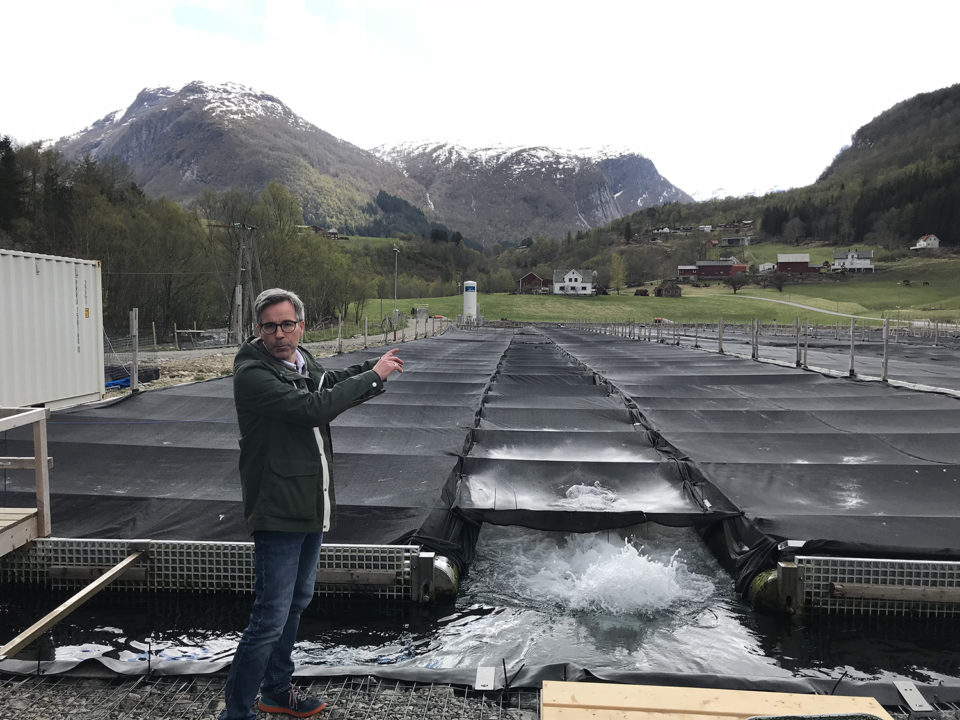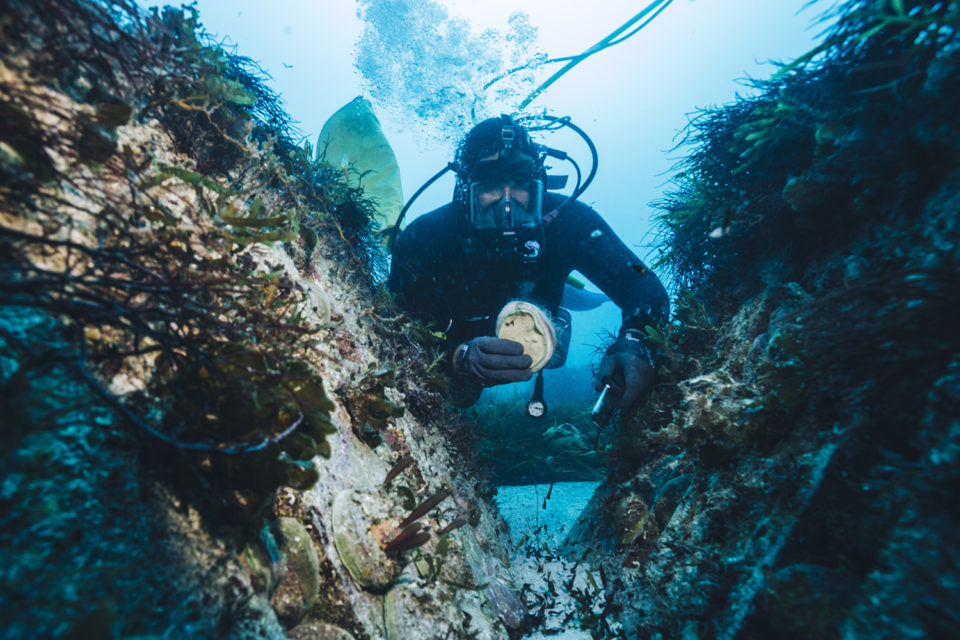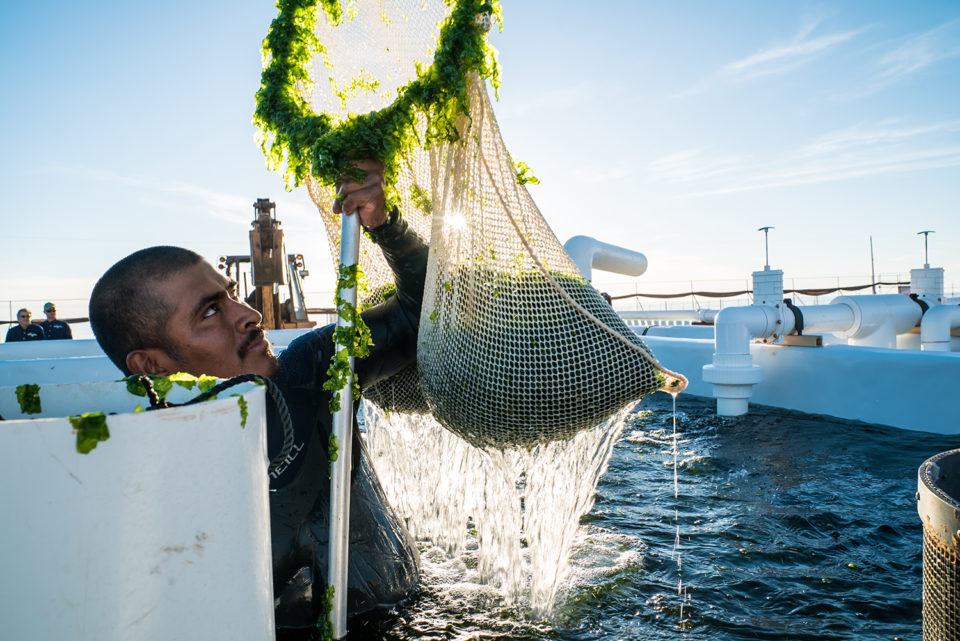‘Aquaculture Pioneers’ team launches fundraising campaign, eyes 2021 release

The route to one of Norway’s most innovative fish farms winds north of Bergen for a couple of hours down narrow roadways and through dark mountain tunnels from which you emerge to discover dramatic seascapes. Upon arrival at the Sogn Aqua land-based halibut farm in Bjordal, next to Norway’s longest and deepest fjord, the word “industrial” isn’t likely to cross your mind.
That’s by design. There are no tall, factory-style buildings anywhere in bucolic Bjordal, so the farm itself is mostly built into the ground, integrated into the surrounding landscape and community, notes Ole-Kristian Hess-Erga, quality and development director for the company. The “snow white halibut” Sogn Aqua raises in a series of long, shallow runways are marketed under the Glitne brand name, and coveted throughout Europe.
“Most visitors say that they have never seen a land-based farm like ours. It is harder to spot, and it does not protrude from the ground. They did not know aquaculture could be done in such a way, and they like it,” said Hess-Erga. “Especially chefs and restaurateurs find the farm fascinating. I believe most of our visitors know aquaculture can be done in a good way.”
Which is precisely what the documentary “Aquaculture Pioneers” aims to portray when it is finally unveiled to the public in 2021, according to Tom Prins, aquaculture advisor to the project from Dongo Films, a Belgium-based production company. Prins, a dealflow manager with venture capital firm Aqua-Spark, based in Utrecht, has introduced his filmmaker partner and sister Marjolijn Prins, who is the director, to a number of cutting-edge operations like Sogn Aqua.

Dongo Films just launched a Kickstarter campaign, with a crowdfunding goal of $360,000 for the shooting stage of the process, which is slated to begin this summer. Prins told the Advocate that while Aqua-Spark helped raise funding for the 3-minute preview featuring Sogn Aqua, which was shown last year at Seafood Expo Global in Brussels, the investment firm is not affiliated with the film.
“We want this to be a documentary that’s cared for by the entire industry – completely objective,” said Prins. “A lot of this is about transparency. A group like [Sogn Aqua] is so open about their practices, how they feed, how they treat their fish and why, how they constructed the farm, how they raise the fish from seed to harvest. They’re completely open and proud about it. It’s rooted in animal welfare and care for the environment. It’s the new way for farmers. We want to show the world that this exists, and that this is what we should demand.”
Hess-Erga said land-based farming is only part of the solution to produce more seafood in a responsible manner. He supports traditional, ocean-based farming as well, if it’s done right.
“Demand for healthy and nutritious seafood will increase, and the only way to meet the demand is to sustainably farm more seafood and manage the oceans better than we have done in the past. Education and trust are key, and the documentary is part of this,” said Hess-Erga.

Flipping perceptions
The oceans are in crisis, the Dongo Films team states in its promotional materials, and aquaculture is eager to shed its “legacy of fast expansion and bad practices.” With efforts like this film – showcasing innovation and sustainability-minded production – the perceptions of the industry may eventually become more positive. It’s an approach that has already worked on the filmmakers themselves.
“In my introduction to world of aquaculture, I had no idea what it was,” said Marjolijn Prins. “My perspective is now influenced by the best stories that have gone around. At Seafood Expo I was inspired by the entrepreneurs and how they get inspiration from nature, from the ocean and where they live.”
The Dongo team is aware that it needs to show that the production standards being upheld by the documentary apply to the entire spectrum of species being farmed today: “I don’t want to just cover expensive, rich people’s foods,” said Tom Prins. “We’re looking at global aquaculture production, species that are consumed all around the world on a large scale. Tilapia, in terms of volume, is three times as big as salmon and farmed in a lot more places.”
Other aquaculture outfits the filmmakers plan to include are Ocean Grown Abalone in Western Australia, which operates inside a protected marine park; tilapia producer Chicoa Fish Farm in Mozambique; McFarland Springs Trout in Northern California, USA; and Blue Evolution, a seaweed producer with farms in Baja California, Mexico, and Alaska, USA.
“[Many people] don’t realize that aquaculture is taking place in the most pristine areas of the world,” said Tom Prins. “We wanted to capture a shared vision of what aquaculture looks like and what it can do for the world. We just think the world needs more good stories about aquaculture.”
Follow the Advocate on Twitter @GAA_Advocate
Now that you've finished reading the article ...
… we hope you’ll consider supporting our mission to document the evolution of the global aquaculture industry and share our vast network of contributors’ expansive knowledge every week.
By becoming a Global Seafood Alliance member, you’re ensuring that all of the pre-competitive work we do through member benefits, resources and events can continue. Individual membership costs just $50 a year. GSA individual and corporate members receive complimentary access to a series of GOAL virtual events beginning in April. Join now.
Not a GSA member? Join us.
Author
-

James Wright
Editorial Manager
Global Aquaculture Alliance
Portsmouth, NH, USA
Tagged With
Related Posts

Responsibility
SeaWeb Seafood Summit in Thailand highlights rise of worker voice
Patima Tungpuchayakul, who rescued more than 5,000 Thai and migrant workers on fishing vessels, punctuates an emotional event kickoff.

Innovation & Investment
Aquaculture Exchange: Carsten Krome, Alimentos Ventures
A business accelerator helps small businesses grow and ready themselves to capitalize on institutional investment opportunities. Sounds exactly what the aquaculture industry needs. Carsten Krome tells the Advocate about the various business models his new firm is investigating.

Aquafeeds
After testing new feed ingredients, Thai Union finds reluctant uptake
The company has engaged in feed trials with both algae and microbial meals, before its sustainability director said farmers, “by and large, don’t want it.”

Responsibility
Haiti’s hatchery of hope
Built on a dream of feeding some of the world’s poorest and most vulnerable people, a charity-built tilapia hatchery in Haiti now learns to stand on its own.

